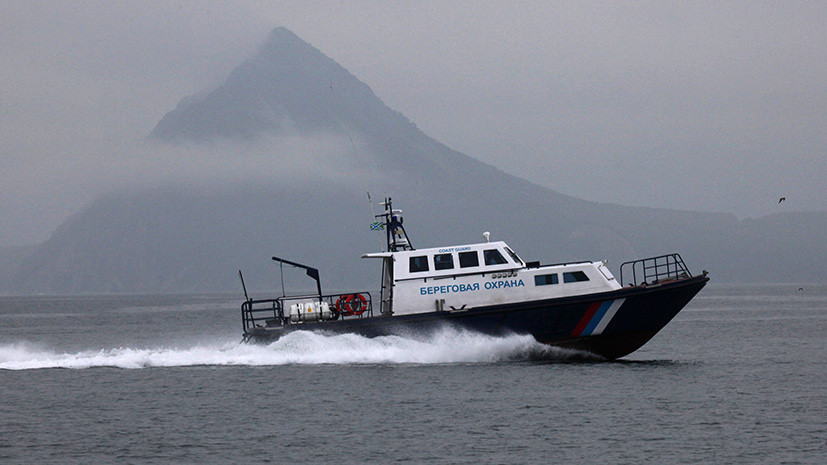Fishermen from a North Korean schooner attacked Russian border guards in the Sea of Japan, and three servicemen were injured. This was reported in the Center for Public Relations of the Federal Security Service of Russia.
According to reports, ships of the FSB border control in the Primorsky Territory carried out activities to protect marine biological resources. Employees of the Russian service found in the exclusive economic zone of Russia - in the area of the banks of Quito-Yamato in the Sea of Japan - two North Korean schooners and 11 motorbots engaged in poaching.
“The crew of the North Korean schooner (more than 45 people) carried out an armed attack on the members of the inspection team of the border ship. Three servicemen were injured of varying severity, ”the FSB press service said.
Later, the department reported that appropriate measures were taken to suppress the illegal activities of poachers in their North Korea.
“Two fishing schooners and more than 80 DPRK citizens were detained,” border guards explained.
In addition, the Information and Press Department of the Ministry of Foreign Affairs of Russia reported that North Korean diplomat Chin Jeong Hyup was invited to the building of the Foreign Ministry on Smolensky Boulevard.
“The DPRK Charge d’Affaires to the Russian Federation will be called to the Russian Ministry of Foreign Affairs in connection with the situation with the detention of North Korean schooners engaged in poaching in the Russian exclusive economic zone,” TASS reports.
Later, information appeared that the diplomat spent more than an hour in the Russian Foreign Ministry and left the building without giving any media comment.
Incident with Xianghailin-8 Seiner
Earlier this summer, another water incident occurred between North Korea and Russia. On July 17, the DPRK border guards detained the Xianghailin-8 domestic fishing vessel, on board of which there were 15 citizens of the Russian Federation and two South Korean nationals. The reason is "Violation of the rules of entry and stay on the territory of the DPRK."
“On July 22, consular officers of the Russian embassy in the DPRK met with the captain, second assistant (they and two South Korean sailors were accommodated in one of the Wonsan hotels), as well as with Russian fishermen who are on the ship. All crew members are healthy, ”emphasized the Russian Embassy in Pyongyang.
At the same time, the leadership of the North-Eastern fishing company owning the seiner noted that the vessel first encountered similar problems in two years of fishing for crab in the waters of the Sea of Japan. According to company representatives, the detention occurred 53 miles from the coast, while in accordance with the 1982 UN Convention on the Law of the Sea, 12-mile zone along the coast and around the islands is considered territorial waters.
“They turned off all communications, seized the phones and escorted to the port of Wonsan. Today, a representative of the Russian embassy visited us - they learned from him, ”explained Victor Sedler, director of the North-Eastern Fishing Company.
On July 25, Deputy Foreign Minister of Russia Igor Morgulov pointed out the need for taking measures to speedily resolve the incident during a meeting with Chin Jeong Hyup, Charge d’Affaires of the DPRK in Moscow.
A day later, the employees of the consular department and the first-aid post of the Russian embassy in the DPRK held a second meeting with the sailors of the Xianghailin-8 vessel.
“A medical examination of the crew was carried out. The condition of the sailors is rated as satisfactory. They were given the necessary recommendations for staying in a country with severe climatic conditions, ”the diplomatic mission said in a statement.
Meanwhile, on July 28, a Russian fishing vessel was released and arrived at the South Korean port of Sokcho.
Water protection
In May, First Deputy Director - Head of the Border Service of the FSB of Russia, Army General Vladimir Kulishov summed up the results of activities for 2018. According to him, more than 8 thousand violations of the legislation on the state border, fisheries and the conservation of aquatic biological resources were identified. At the same time, 39 Russian and foreign vessels, as well as 1,037 small vessels, were detained.
The FSB also proposed strengthening responsibility for poaching at sea. The corresponding bill was published on the portal of draft regulatory acts. The document assumes that the Code of Administrative Offenses (CAO) will be used not only to determine liability for violation of fishing rules, but also to regulate penalties for illegal extraction of aquatic biological resources, which, in addition to fish, include mollusks, crustaceans and algae consumed as food.

